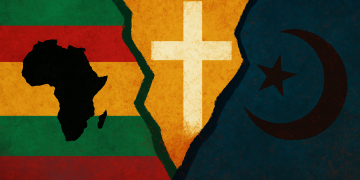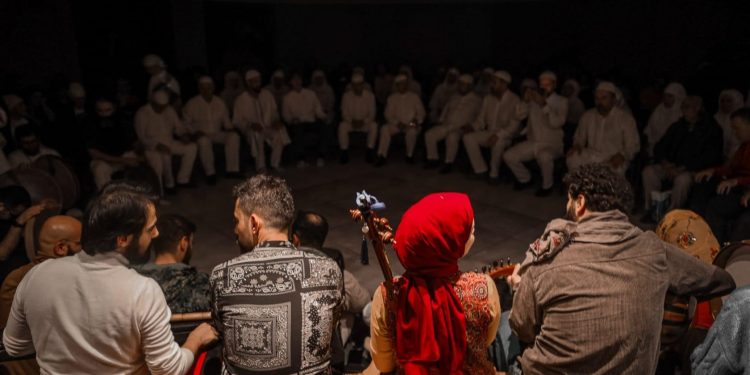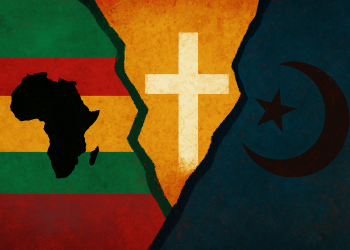In Sufi music, meshk is a form of music performed directly beside the teacher to learn the compositions. In the Sufi music tradition, certain places where meshk is performed are called “meshkhane” (“hane” meaning house; house of meshk). However, it is also known that meshk is performed outside of meshkhanes. A meshk ensemble is analysed in this ethnographic study with data I collected through participant observation. Even though we can position this community musically in a different place from Sufi music, it can also be related to the realm of Sufism due to its grounds and motivations.
The places where the Afro-Arab Meshk Ensemble performs meshk are considered “meshk spheres” instead of the definition of meshk lodges in the literature. This difference is because these places do not have an organic relationship with meshk, and every place where the group is present and starts to make music suddenly turns into a meshk place. The place is suddenly transformed into a music space, gathering its own audience and the place of meshk is transformed into a music “sphere”. In this sense, instead of space as an identifiable area with definite boundaries, the concept of “sphere” emerging as a result of the interaction is a more suitable concept for the meshk places of the Afro-Arab community. Meshk performers do not have a specific stage; moreover, they do not separate themselves from the audience. The group members form a small circle. The only sign that separates them from the audience is this circle. However, the circle is open to anyone who wants to join.
Due to the lack of a rigid structure in these meshk spheres, where they started quite flexibly, and the meshk conductor is open to everyone, meshk has become a haunt and various “networks” have been established. In the interviews with different performers, they expressed that the meshk sphere turned into a “friendly gathering”, that the performers liked to listen to other performers, and that a “sphere”, a sphere of “sincerity”, emerged there for such reasons.
In addition to shared principles among performers due to their musician identities, interviews also indicate that the commonality of the group members through Sufi music is an essential element that develops the group culture. The instruments used by the band members are generally instruments from the Sufi music tradition. The rebab, known as the Mawlavi saz, percussion instruments such as oud and ney, significant instruments of Sufi music, as well as instruments such as bendir, erbane, kudüm and halile (cymbal) are used in meshk. All the performers have somehow been in places where Sufi music was taught, learned, and meshk’d (performed). Hence, their experience in Sufi music is a very decisive commonality for the group. In this sense, the meshks, which are a practice of the Sufi tradition, show that the musicians do not only make music but also have a specific relationship with this tradition.
The performers, who are Mauritanian migrants in Türkiye, have become a community to preserve the small group culture, and this communalisation has been realised based on Sufi culture.
Moreover, their relationship with this tradition is also related to their ethnic origin. The performers, who are Mauritanian migrants in Türkiye, have become a community to preserve the small group culture, and this communalisation has been realised based on Sufi culture. Therefore, meshk is a family practice into which they were born. What they have in common with other performers who are familiar with the Sufi tradition is that they see meshk as places where one “remembers Allah”. Thus, it appears that Sufi inclination played a significant role in shaping the values of the Afro-Arab Meshk Ensemble. Dhikr, remembrance of Allah, “experiencing spirituality”, and recalling the past stand out as the motivations that bring them together.
The repertoire of Afro-Arabic meshk consists entirely of hymns. The main conductor of the ensemble explains some of the qualities of the group, relating the main motivation for the group to come together to the Sufi dimension of the meshk. Described by the participants as a circle of sincerity in which Allah is remembered, the mashkis are also a form of worship for the leader. The ethnic origins of the meshk performers emphasise a cultural capital that led to the composition of the Afro-Arabic repertoire. The conductor, who played a pioneering role in establishing the group, explained the Afro-Arabic repertoire that comes from his own musical background in detail. Having made many visits to the Arab world, Performer A[1] has been to various parts of this geography at different times for long periods and engaged with the local music culture. The “Arab” part of the Afro-Arabic naming references the hymns learned in the local music culture, especially in Egypt. In this sense, the ethnic origins that constitute past experiences are seen as a visible link that goes beyond the discourse of “we make music”.
The “Afro” used in the naming of the ensemble signifies the conductor’s African roots. One participant explained that African inspiration has various effects on the repertoire: “African music is both rhythmic and energetic; that’s why the word Africa is emphasised in the name. It is always rhythmic. There is always exhilaration, joy, and a kind of enjoyment.”
The emphasis on ethnicity and the Sufi culture that carries the Afro-Arab community beyond being a music group and gives it a cultural meaning becomes visible through the Afro-Arab repertoire. The repertoire is essentially the cultural carrier of the group. With a vast repertoire, Afro-Arab adds one or two new hymns to the repertoire every week in addition to the fundamental hymns. However, the order in which the repertoire is performed usually remains the same. The meshk starts with ney taqsim (musical improvisation) in a Turkish style and continues with an Arabic hymn. Hymns from different regions continue with a common rhythm. Turkish pieces are recited and diversified according to the situation of the meshk environment. Usually, one or two Turkish pieces are performed. Closing is always done with a Mauritanian hymn. In all these series, the methods inherent in Sufi culture are followed or transformed in a way adapted to the group’s own style. The most obvious example is before the taqsim is over, the soloist starts to duel with the neyzen (ney player) with their bendir. Such variations and the hymns included in the repertoire make the values of the group visible.
Afro-Arabic style meshk has an order of its own, unlike classical Sufi music. The Afro-Arabic Meshk Ensemble’s primary performers consist of seven people. In all meshks, there is at least one more performer who is added to the main group. Meshks are performed with the soloist Performer A, who is also the main conductor and directs the meshk group in various ways. Performer D[2] defines meshk spheres as “assemblies” and states that there is a procedure in these assemblies: “… There is always a chief of the assembly. The chief here is the Performer A”, pointing out the main point about the organisation of the meshks. However, the directions by the chief/conductor are generally related to the “continuation”, the smooth conduct of the meshk. The director, who is concerned with the progression of the repertoire, does not interfere with the way any musician plays music.
This is one of the most critical elements distinguishing Afro-Arab from other meshk ensembles and traditional Sufi music environments. This quality has also been an important factor in the preferences of group members to be in Afro-Arab. The fact that “no one interferes with anyone else”, “no one is patronising”, and “no notes are given”, in other words, the fact that meshk is performed in a very flexible way highlights the order within the disorder of Afro-Arab meshk. The fact that the group is a “sincerity-based” organisation has ensured the continuation of the meshk order in a complimentary manner. Nevertheless, the only area where the meshk ensemble is intervened is the seating arrangement of the performers. Meshk is performed on the carpet because the performers desire to be with the audience/participants; there is no specific stage. However, the lights are partially switched on; the atmosphere is dim. I believe they prefer dim light to allow people to focus on the music rather than watching each other.
The absence of a boundary between the participants and the musicians is an important element in the atmosphere they wish to create. In addition, the performers do not sit scattered, but a circle is formed in the middle of the audience with all the performers side by side. The preference for this circle format over the usual concert format is also related to the fact that although there is a specific repertoire, the repertoire continues randomly in each meshk. The performers make the transitions between the pieces by following each other with small note changes. Thus, it makes it necessary for them to be face to face/eye to eye during meshk. Furthermore, instruments that have the potential for “duelling” with each other are situated opposite each other. This is why the neyzen (ney player) and the soloist always try to sit opposite each other. A person playing a percussion instrument is seated next to those playing wind or string instruments. I have observed that they try to balance the sound in this way.
In addition to environmental conditions, certain routines are involved in the meshk order. The first is that the performers start with an introduction to the meshk before starting the meshk. The soloist of the group, Performer A, makes introductions in Turkish, which are then translated into English by Performer B. In this speech, which can also be described as a welcome speech, all participants are welcomed, and it is expressed that it is vital to accompany the meshk.
The soloist interprets being together as “Capturing Tawhid (unification of Allah)”.
It is emphasised that it is very important to participate in the repetitive parts of the hymns, and it is requested not to leave the meshk place until the end of the performance. Emphasising the importance of following the meshk, they highly value silence when the meshk starts, especially when only instruments are used. Almost the same speech is given in all meshks. In some meshks, the soloist asks if there are any newcomers, especially when he realises many new faces. When there are multiple new people, their participation is especially emphasised. The emphasis on involvement is related to creating a sense of unity among everyone present, conveying the idea of togetherness in this ensemble. The soloist interprets being together as “Capturing Tawhid (unification of Allah)”. A phrase is always used at the end of the speech: “When I say we are all here together? Capture Tawhid”.
This question of the soloist continues until harmony is reached, that is, until everyone voices the answer. The harmony as an answer to the question is an important factor in determining participation in the meshk. In this sense, the soloist has a guiding influence both on the meshk group and the participants. In meshks, sometimes, some instruments can drown out the sound of other instruments, and in such cases, the performer may break away from the meshk. Noticing such situations, the soloist encourages all performers to participate in the meshk. For example, the percussion instruments are silenced, and wind or string instrument performances are added in between.
It is significant for the performers that the participants are involved in the meshk and the music. The performers try to create an atmosphere of “fellowship” (mohabbat). During the music transitions, performers joke about the group to familiarise people with the group. An environment where there are no boundaries, both musically and socially, is created through hymns. Sometimes, they put instruments in the hands of regular participants who have now become familiar, or performers exchange their instruments. Yet they do not even need extra time for this. A space of exchange is provided both within the group and with the individuals “outside”/on the periphery. Amid all this communication, meshk itself continues. “Capture Tawhid” is the prominent motto of the group and a key expression to characterise this whole process of togetherness. In Afro-Arabic meshk, it is a fundamental concern for the group to establish unity and become “one” through music. In this sense, the formation of groups here seems to occur through the cultural exchange in the Afro-Arab meshk sphere. A new culture emerges through Afro-Arab music.[3]
The amusement of the lovers of Haqq is Tawhid. (Niyazi Misri)
[1] Interviewee, the conductor of the meshk ensemble.
[2] Interviewee, a member of the ensemble.
[3] For the concert recording of the Afro-Arab Meshk Ensemble, see: https://bit.ly/3QEgAWG












































